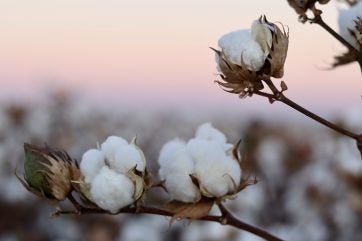
The Impact Report 2023 outlines the results of programmes in the cotton production year 2022-23, during which CottonConnect said it trained over 523,000 farmers in sustainable agriculture programmes in India, Pakistan, Bangladesh, China and, for the first time, Egypt.
The programmes include CottonConnect’s flagship REEL Cotton (including Women in Cotton); Organic Cotton Farmer Training Programme; REEL Regenerative pilot and Health and Safety for Gins.
CottonConnect shared that the cotton grown is directly traceable through supply chain linkages into brands’ supply chains. In 2022-23, 170,000 MT cotton lint was traced through CottonConnect’s traceability software tool, TraceBale.
CottonConnect CEO Alison Ward stated doing less bad is no longer enough if we are to address the impact of climate change across supply chains.
She said: “We are proud of the work we are doing to test and scale new solutions that tackle environmental challenges, improve health and wellbeing and build inclusive economies, and in particular of the many fantastic partnerships we have formed that have helped us deliver this.
“We are broadening KPIs and impact measurement to include climate KPIs and are developing in-house capability to measure the impact of our programmes in reducing Greenhouse Gas (GHG) emissions, via an LCA calculator and using the Cool Farm Tool. With new legislative controls emerging, our verification frameworks will become increasingly critical to everyone involved in the cotton supply chain.”

US Tariffs are shifting - will you react or anticipate?
Don’t let policy changes catch you off guard. Stay proactive with real-time data and expert analysis.
By GlobalDataREEL Cotton Programme
The second and third-party verified results of the REEL Cotton Programme in 2022-23 reveal a reduction in inputs affecting soil health and the environment when compared with control farmers. According to the results, water usage reduced by 21.6%, chemical pesticide use by 17.1% and chemical fertiliser use by 14.4%.
Moreover, the results noted an increase in yield (up by 18.5%) coupled with a reduction in input costs (down by 15%) and a 47% rise in profit for farmers.
CottonConnect explained these outcomes were achieved through a farmer-led, three-year programme, with criteria developed specifically for cotton farmers’ needs to support them in adopting sustainable agriculture practices.
Ward emphasised that this year, CottonConnect set goals for REEL Cotton in the areas of Environment and Climate, Traceability, and Social. She said these ambitions were set to support brands’ and manufacturers’ ESG goals for cotton and textiles production.
Women Climate Change Ambassadors programme
The report on work with women farmers shows that over 240,000 women participated in Women in Cotton programmes, contributing towards achieving CottonConnect’s goal of training 500,00 women by 2030.
Amongst the 42 women who were trained to become climate change ambassadors through the pilot programme, CottonConnect noted that overall awareness of the definitions of global warming, weather change, and climate change increased from 2% to 98% after training.
There was also a significant increase in awareness regarding the broad impacts and causes of climate change (from 1% to 73%) and sources of greenhouse gases (from 36% to 62%).
CottonConnect said it set up the Women Climate Change Ambassadors programme in 2022 to help empower women farmers as change leaders in climate resilience, recognising the pivotal role women place in cotton farming.
REEL Regenerative cotton pilot
The regenerative cotton pilot was introduced in Gujarat, India in 2022 based on the REEL Regenerative Code.
The pilot saw 74.7% of farmers embracing practices to enhance biodiversity, 10% adopting homemade bio-pesticides and 23% reducing chemical fertilisers and carbon emissions per acre farmed.
CottonConnect said this initiative is an ongoing part of its efforts to embed regenerative farming practices through its programmes.
Cotton Connect published its first Impact Report in February last year, which focused on the results of its programmes in the cotton production year 2021-22 across Pakistan, China, India and Bangladesh.



